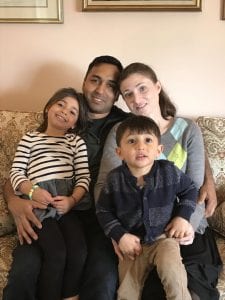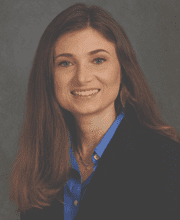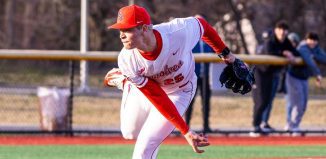SBU’s Jennifer Keluskar combines clinical work with research in autism
By Daniel Dunaief
In the second of a two-part series, Times Beacon Record News Media describes the clinical and research work of Jennifer Keluskar, a Clinical Professor in the Department of Psychiatry at Stony Brook University.
Keluskar and Matthew Lerner, an Associate Professor of Psychology, Psychiatry & Pediatrics (see last week’s paper), recently received a grant from the Office of the Vice President for Research & the Institute for Engineering-Driven Medicine to study the effects of COVID-19-induced social isolation on people with Autism Spectrum Disorder.
Keluskar spends half her time working at the Outpatient Department of Psychiatry, Child and Adolescent Services, where she provides cognitive behavioral intervention and ASD diagnostic evaluations for youth with autism, and the other half working on the SB Autism Initiative.
The pandemic has challenged young people with autism, as they manage through social isolation and worry about an uncertain future. Many of Jennifer Keluskar’s patients are struggling, with some dreading the return to school in the fall and others grappling with the removal or change in a routine or structure.
Some of her clients have felt increased pressure to organize their time and be productive amid a lack of peer support and without the opportunities to model their performance based on interacting with other students at school.
Through modeling, some students take notes when they notice their classmates writing down concepts or ideas a teacher is sharing or gaining some measure of reassurance when they see that everyone is struggling with the work load.
“This latter point is particularly relevant given the novelty of this situation for teachers as well as the consequent likelihood that they will have trouble knowing how much work to give, especially given the wide variety” of circumstances at home, Keluskar explained in an email.
For some students with autism who have a measure of social-anxiety disorder, the remote learning environment has provided some measure of relief, reducing the difficulty in reading nonverbal cues from their classmates and teachers.
Now that these students are learning remotely, these “social stressors have been lifted,” Keluskar said.
Nonetheless, even the patients who have felt relieved about fewer anxiety-inducing social interactions are starting to develop concerns about a potential resumption of classes in the fall.
Keluskar has already seen some patients who are perseverating on that future upcoming transition. “We are going to see more of it in my clientele as we get closer to reopening schools,” she said, adding that she has some patients who are afraid of not being able to advance in life, to college or to jobs, but who, at the same time, are afraid of taking the next step after getting used to quarantine.

Working with Alan Gerber, a graduate student in Matthew Lerner’s lab at SBU, Keluskar will assess responses to COVID-19. They have sent out two questionnaires. One, which was released by other researchers, examines how the pandemic has affected circumstances and behaviors, from employment changes to junk food consumption. The other is an evidence-based measure of parental stress that is not specific to the virus. She is going to measure anxiety and depression to see how they change during quarantine.
Keluskar appreciates how the Initiative offers programs such as a homework club, which students can attend virtually for an hour each day. “I have connected some of my clients in the clinic to undergraduate mentors and so far this has been quite successful” although the scale of these connections has been small so far.
The Initiative currently has a mentoring program geared towards older adolescents. She is planning to offer this program to younger individuals.
Deborah Gross, the Initiative’s coordinator, runs a program called the Sidekicks Squad, which is for older adolescents and young adults with special needs.
“Some of my patients would benefit from pairing with a mentor,” Keluskar said. “Through these mentoring sessions, people with autism hang out with their mentors.”
Child-directed interpersonal time is “so important for people’s well being and development,” Keluskar explained, referring to both the mentor and the mentee.
She appreciates that this mentoring program is laid back and fun and believes that mentors benefit just as much from it as mentees.
Through the Initiative, the group has also done eight weekly, Facebook livestream events. The organizers discuss a topic and add three tips at the end. The tips have provided suggestions, including: using creativity to engage children by adding special interests into activities; taking a collaborative problem solving approach when running into difficulties getting a child to cooperate; and understanding emotional underpinnings to children’s behavioral difficulties.
Keluskar recognizes the challenge that come from having self-directed resources available to children and their parents. Even when people have access to many resources, they do not always know where to begin or what to prioritize, she said.
She advises a parents to try to get enough rest for themselves. “You need to take care of yourself so you can model [appropriate behavior] to your children,” she said.
Through the pandemic challenges, Keluskar also urges parents to be creative in their responses to the stressors that are affecting them and their children. She suggests people to take chances in how they approach their interactions with anxious children.
“You can’t be creative if you’re afraid of being wrong,” she said. “Being able to move past little mistakes shows flexible control. Set limits and be structured, but also be flexible at the same time.”
A resident of Commack, Keluskar lives with her husband Raja Keluskar, who is an engineer, their five-year old daughter Skylar and their three-year old son Colby.
Keluskar said she has been anxious about public speaking since she was young and can empathize with others who struggle with this. Through Facebook groups and other efforts, she said she can “personally attest to the value of multiple exposures and say that it can even become enjoyable with time and practice.”







